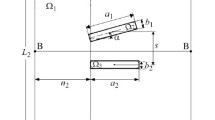Abstract
A rigid-plastic finite element method which is based on the upper bound theory in plasticity is applied to the study of deformation behavior of inhomogeneous materials with inclusions. The penalty method and the Newton-Raphson's repeated calculation are adopted to minimize the functional and to obtain the solution. Characteristics of the deformation behavior of inhomogeneous material with inclusions are discussed based on the calculated results.
Similar content being viewed by others
References
Abe, T.; Nagaki, S.; Maeta, Y.; Okabe, Y. (1986a): Inhomogeneous deformation of grains and roughening of free surface of polycrystalline copper in compressive plastic deformation. Bull. JSME. 29, 1104
Abe, T.; Nagaki, S.; Hayashi, T. (1986b): Plastic deformation of metallic materials with elliptic inclusion. Bull. JSME. 29, 2797
Ashby, M. F. (1966): Work hardening of dispersion-hardened crystals. Philos. Mag. 14, 1157
Avitzur, B. (1973): Tensile strength of composite materials. Trans. ASME J. Eng. Ind. 95, 827
Eshelby, J. D. (1959a): The determination of the elastic field of an ellipsoidal inclusion and related problems. Proc. R. Soc. London Ser. A 241, 376
Eshelby, J. D. (1959b): The elastic field outside an ellipsoidal inclusion. Proc. R. Soc. London Ser. A252, 561
Hata, K.; Ishikawa, H.; Yamamoto, K. (1974): An analysis of extrusion by the finite element method. J. Technol. Plasticity 15, 1003 (in Japanese)
Hill, R. (1963): Elastic properties of reinforced solids: some theoretical principles. J. Mech. Phys. Solids 11, 357–372
Klie, W.; Lung, M.; Mahrenholtz, O. (1974): Axisymmetric plastic deformation using finite element method. Mech. Res. Commun. 1, 315–320
Lee, C. H.; Kobayashi, S. (1973): New solutions to rigid-plastic deformation problems using a matrix method. Trans. ASME Ser. B 95, 865
Osakada, K.; Nakano, J.; Mori, K. (1982): Finite element method for rigid-plastic analysis of metal forming-formulation for finite deformation. Int. J. Mech. Sci. 24, 459
Price, J. W. H.; Alexander, J. M. (1976): A study of the isothermal forming or creep forming of a titanium alloy. Proc. 4th North American metalworking res. conf., p. 46
Tada, Y.; Oyane, M.; Shima, S.; Sato, T.; Omura, M. (1983): An upper bound approach on deformation on two-phase materials in uniaxial tension. Trans. ASME J. Engl. Ind. 105, 39
Tomota, Y.; Tamura, I. (1982): Mechanical behavior of steels consisting of two ductile phases. Trans. Iron Steel Inst. Jpn. 22, 665
Yagawa, G.; Aisawa, T.; Ando, Y. (1980): Crack analysis of power hardening materials using a penalty function and superposition method. ASTM STP700, p. 439
Zienkiewicz, O. C.; Godbole, P. N. (1975): A penalty function approach to problems of plastic flow of metals with large surface deformations. J. Strain Anal. 10, 180
Zienkiewicz, O. C. (1977): The finite element method. London: McGraw-Hill
Author information
Authors and Affiliations
Rights and permissions
About this article
Cite this article
Nagayama, N., Abe, T. & Nagaki, S. Plastic deformation of inhomogeneous materials with elliptic inclusions. Computational Mechanics 4, 433–441 (1989). https://doi.org/10.1007/BF00293049
Issue Date:
DOI: https://doi.org/10.1007/BF00293049



